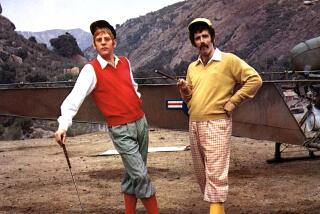THE BIG PICTURE
- Share via
I usually try to avoid getting into dust-ups with critics writing in my own newspaper, but I can’t avoid coming to the late Robert Altman’s defense after reading Richard Schickel’s nasty, dismissive review last week of “Robert Altman: The Oral Biography” by Mitchell Zuckoff, a new book about the man who brought us “MASH,” “McCabe & Mrs. Miller,” “Nashville,” “The Player,” “Short Cuts,” “Gosford Park” and any number of other smart, funny and challenging films.
My primary problem with the review is that if Schickel has no respect for Altman as a filmmaker, how would he possibly be in a position to give a fair review to an exhaustive biography of the man? And it’s certainly obvious that Schickel loathes Altman’s work, since he starts out by ridiculing “MASH” as “a basically witless film,” then moves on to trash the rest of Altman’s oeuvre, saying that “misanthropy -- with a strong admixture of misogyny -- essentially substitutes for ideas in his movies and his characters are, in effect, characterless.”
Schickel seems especially aggrieved that Altman was a boozer and a pothead who -- as Schickel puts it in the first sentence of his review -- “never passed an entirely sober day in his life.” In fact, Schickel seems obsessed with Altman’s licentiousness, admonishing Altman over and over for his freewheeling ways, as if he were the first filmmaker ever to use and abuse a variety of intoxicants. He comes off like a priggish schoolmarm, rapping Altman on the knuckles for having a good time, calling him “permissive,” “addled by his addictions” and claiming that even in “MASH,” everyone in the movie “appeared to be perpetually, mumblingly stoned.”
Largely because Zuckoff writes admiringly of Altman’s work, as have so many other critics, Schickel throws the filmmaker’s biographer under the bus, claiming that Zuckoff “basically knows nothing about filmmaking and film history.” I could go on, but you get the point.
It would be an understatement to say that Altman admirers were outraged by Schickel’s dismissive attitude to one of the great filmmakers of the late 20th century. Speaking to this point, I received a letter from Alan Rudolph, who linked up with Altman as an assistant director on “The Long Goodbye” before carving out an important career as a filmmaker himself, making such movies as “Welcome to L.A.,” “Choose Me” and “Afterglow.”
Rudolph’s entire letter can be found on my blog, but here is his artful description of Altman’s special gifts as a filmmaker. As Rudolph writes: “Altman was an innovator. His films might seem casual, but intentionally so. They were behavioral in appearance, but carefully crafted with ideas, and strong on consequence. Having served as a screenwriter for Bob, I can personally attest to his rigorous attention to writing. He just didn’t want the result to seem written. . . . Bob knew that continuously working in the rough was the best way to find his jewel. His biting humor never spared reality nor himself. The painful absurdity of it all. There was nobody like him during his professional peak, and there isn’t now.”
Well said, Mr. Rudolph. As for me, all I would ask of anyone who might be on the fence about Altman is to seek out one of his many adventurous films and watch for yourself. You’ll never be bored and you’ll almost always be amazed by what an original, unsentimental approach Altman had to the art of cinematic storytelling. The UCLA Film & Television Archive has a salute to Altman coming up soon, starting with a Nov. 13 screening of “The Long Goodbye,” his 1973 comedy that is a personal favorite of mine.
--
patrick.goldstein @latimes.com
More to Read
Sign up for our Book Club newsletter
Get the latest news, events and more from the Los Angeles Times Book Club, and help us get L.A. reading and talking.
You may occasionally receive promotional content from the Los Angeles Times.










